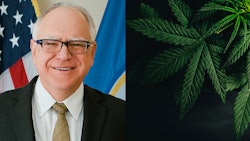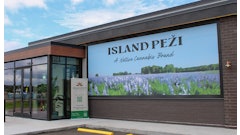
As Minnesota cannabis regulators attempt to speed up their adult-use licensing process, a tribal community outside Minneapolis plans on getting a head start with the launch of its own adult-use dispensary this summer.
Prairie Island Indian Community (PIIC), one of 11 federally recognized tribal governments in Minnesota, recently launched the new business venture Island Peži (pronounced “pay-zhee,” meaning grass), a native cannabis company that plans to serve those 21 and older at its dispensary.
After obtaining necessary tribal licensure and approval, the Island Peži retail facility is set to open next to PIIC’s Dakota Station, a gas and convenience store located along the Mississippi River and just across the state line from Wisconsin.
The tribal community expects the entrance into the cannabis industry to create another avenue of economic diversification and to develop generational opportunities, according to a PIIC news release.
This cannabis avenue is expected to complement PIIC’s Treasure Island Resort and Casino. Tribal gaming got its start on the Prairie Island reservation with high-stakes bingo in 1984 and expanded to casino gaming following the Indian Gaming Regulatory Act of 1988, which helped provide a self-sufficient engine to drive PIIC’s government and economy.
“Island Peži is a step forward in our efforts to diversify our economy and strengthen our tribe’s long-term financial sovereignty,” Prairie Island Tribal Council President Grant Johnson said in the release. “We’re excited to be among the first to enter the cannabis market and create new opportunities for the future of our tribe.”
The PIIC members are descendants from the Bdewakantunwan (“those who were born of the waters”) Band of Eastern Dakota and will join Red Lake Nation and White Earth Nation, which opened dispensaries last year just months after Minnesota became the 23rd state to legalize adult-use cannabis in the U.S.
RELATED: Minnesota Governor Signs Cannabis Bill Into Law
Minnesota law allows adults 21 and older to purchase up to 2 ounces of cannabis from licensed retailers and possess up to 2 pounds in their private residences as well as grow up to eight plants (four mature) at home. These provisions became effective in August 2023.
But while the rulemaking process for a forthcoming commercial market has continued to unfold in 2024, with the state anticipating launching adult-use sales in the first quarter of 2025, according to the Minnesota Office of Cannabis Management (OCM), tribal nations are increasingly taking advantage of the leadup period.
Although an OCM study released in January determined the state would need to issue at least 381 adult-use dispensaries to comply with state law—which mandates local municipalities to allow at least one retail facility for every 12,500 people—state regulators released a legislative proposal earlier this month in an effort to expedite the licensing process.
Specifically, OCM officials proposed allowing up to 50 temporary licenses for retail businesses that would be issued to qualifying social equity applications who have been disproportionately impacted by cannabis prohibition, including individuals with cannabis-related convictions and those who live in low-income areas.
In addition, regulators proposed changing social equity ownership requirements from 100% to 65% for businesses to qualify for this license type. The proposal also is to replace the points-based application scoring system to a lottery-based model.
With these changes, some social equity stakeholders fear the OCM will create an opening for out-of-state interests to take advantage of the system, but OCM Interim Director Charlene Briner said the proposals are rather to help ensure social equity businesses have access to capital, Fox 9 reported.
“I want to make very clear: This is not pay-to-play,” Briner told the news outlet. “This is not an opportunity to flood the system.”
These state regulations don’t impact sovereign tribal nations, which have the authority to determine how they want to oversee businesses—including cannabis—on their land, and Minnesota does not have jurisdiction to regulate tribes, according to OCM.
On Prairie Island, PIIC enacted its own Cannabis Regulatory Ordinance, which authorized the tribe’s licensing and regulatory system for cannabis within its jurisdiction.
Minnesota’s cannabis law allows the governor or a gubernatorial designee to enter into compacts with tribal governments to address jurisdictional issues related to cannabis, according to OCM’s guideline on tribal partnerships. But these compacts are not mandated.
"A state compact is not required for our cannabis operation on tribal land," Blake Johnson, president of Prairie Island CBH Inc., told Cannabis Business Times.
CBH is a PIIC corporation created to manage its cannabis-related economic development interests. The corporation owns and operates the Island Peži dispensary.
Although CBH hasn't entered into a compact with the state for its cannabis operation, the "compacts are intended to enhance public health and safety, ensure safe and well-regulated medical and adult-use cannabis markets, encourage economic development, and provide fiscal benefits to both tribal nations and the state,” according to OCM’s guideline.


























